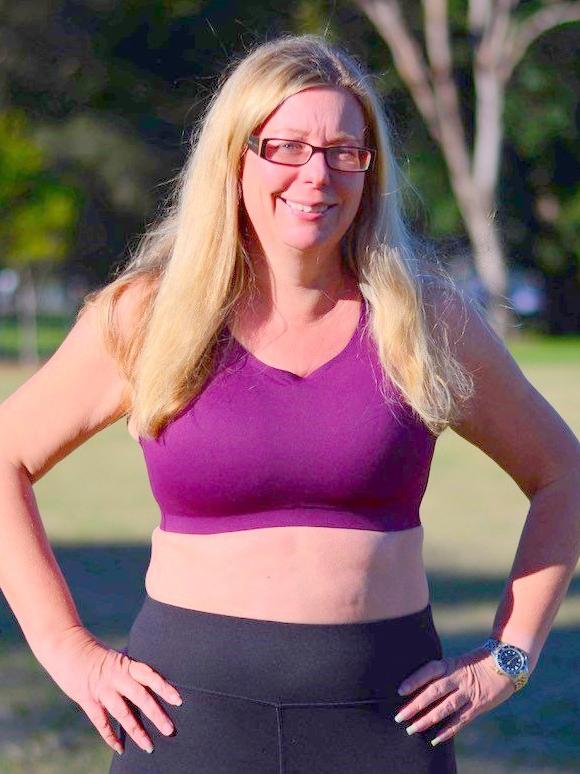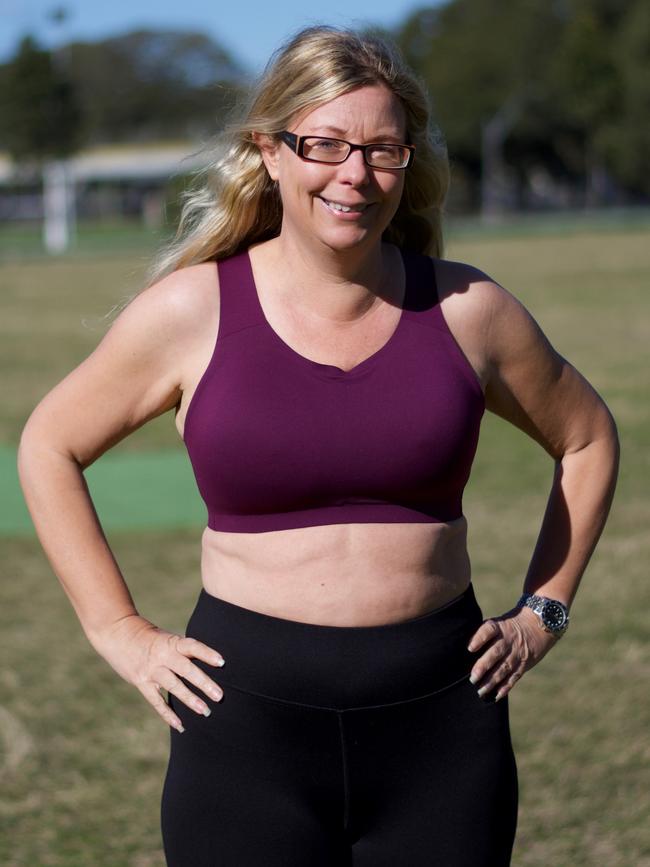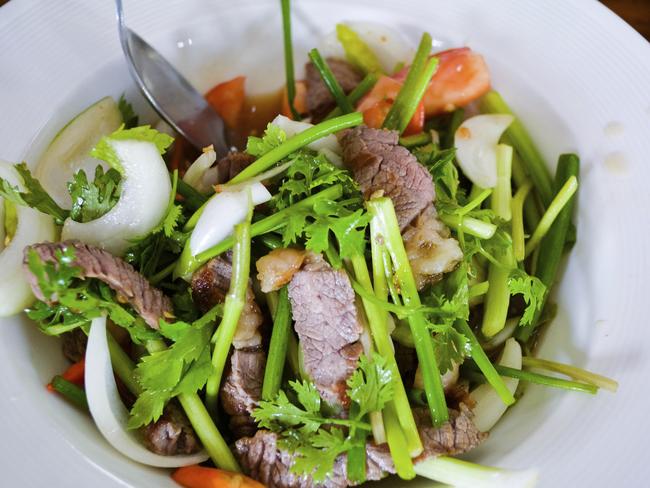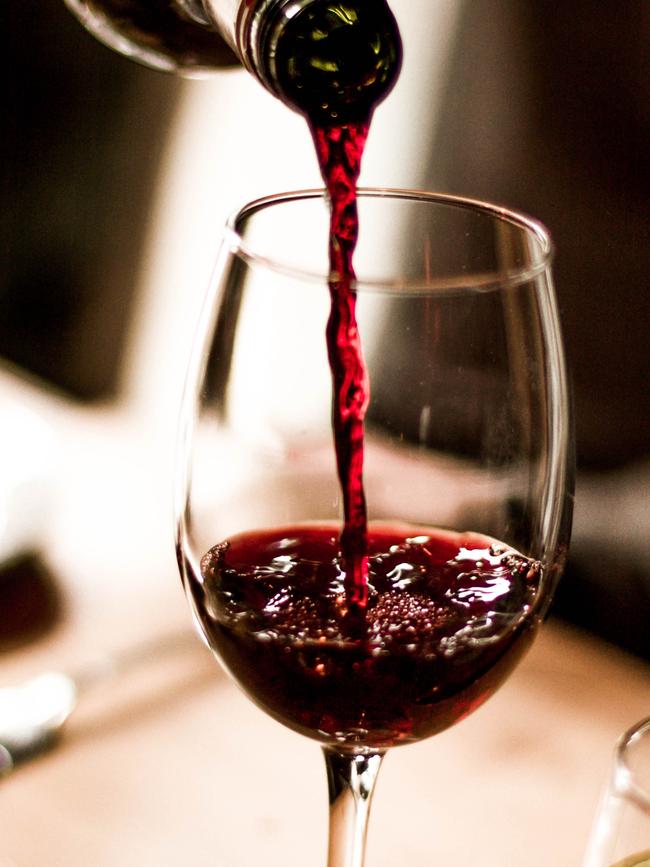How eating more can actually help you lose weight
Losing weight means cutting back on the amount you eat, right? Think again, says body+soul reporter Helen Foster, who reveals how she lost 5cm from her stomach in just four weeks by doubling her food intake.
Body+Soul Daily
Don't miss out on the headlines from Body+Soul Daily. Followed categories will be added to My News.
‘You don’t eat enough’ is a phrase at least three nutritionists have said to me over the years.
It’s a confusing statement when you’ve been brought up with the idea that eating more is what gets you fat in the first place and that kilojoule deprivation will make you slimmer.
And getting slimmer has definitely been my mission in recent years, ever since an injury stopped me running and I gained 5kg as a result. A typical day on a diet would start with no breakfast and about five cups of tea before lunch.


Then lunch might be chicken or mozzarella slices with tomato and cucumber (no dressing), and dinner would be chicken or lamb with vegetables, and sometimes a glass of wine. Carbs out, snacks gone. Yet, the scales barely shifted.
“I’m not surprised,” says sports dietitian Alicia Edge from Compeat Nutrition.
“That amount of food is likely to be under your resting metabolic rate — the amount of kilojoules you burn just staying alive — and when you consume that little food, it sends your body into starvation mode, slowing your metabolism.”
This means my body is burning kilojoules more slowly than it normally would, which has a knock-on effect on my weight.
MORE FROM BODY+SOUL:
How to ditch headaches for good
Eat your way to better mental health
It seems that my body is crying out for me to eat more — the question is: will eating more actually help me lose weight?
REVVING UP MY METABOLISM
Alicia says there’s no question that my metabolism needs a boost — and that means consuming more kilojoules.
I fill in a food diary for a few days and provide details about my exercise habits (three gym sessions a week), height and weight so she has all the information she needs to build my eating plan.
Instead of my normal 5000-6000kJ a day, she wants me to eat 7000-8000kJ a day for four weeks.
“You need to aim to eat 10-15 per cent fewer kilojoules than you burn in a day, which you can work out using a metabolic-rate calculator online,” she tells me.
“That’s enough to create enough of a kilojoule deficit that leads to weight loss, but without slowing your metabolism.”

Breakfast is added and lunch is a salad so large that making it the first day takes three different bowls.
Dinner varies, but always contains protein like chicken, salmon, steak or kangaroo, and a plate heaving with salad or vegies. Oh, and I get a small handful of nuts and some Greek yoghurt as snacks if I want them — it feels like I’ll be eating twice as much food.
I’m surprised that the plan is pretty low-carb — because Alicia is a sports dietitian, I was expecting lots of them.
“Carbs aren’t bad, but if you’re just sitting at a desk all day, you don’t need that many. We tend to only add them in on exercise days,” she explains.
The first day is strange. Eating breakfast after all this time feels weird. Lunch is filling and dinner is … stressful.

I hate cooking and have a huge tantrum peeling garlic for my stir-fry. But as week one progresses, the cooking gets easier, and I’m enjoying not feeling hungry all the time.
After a dedicated first week, I shed a kilo, which feels great.
Things slow down a bit due to a very hectic social life in week two, but by the end of four weeks, the results are impressive.
Not only have I lost almost 2kg, I’ve also shaved 5cm off my stomach and 3cm off my waist.
Another big change is that I no longer wake up coughing (I have mild asthma). Whether this is because I’m not having any wine or because the diet contains many anti-inflammatory ingredients like oily fish, vegies and olive oil, I don’t know, but it’s a welcome side effect.
“This is a great result,” says Alicia.
“Losing about half a kilo a week is ideal, so you’re right on target. It’s also good that you measured yourself. We get so focused on losing weight, but weight can fluctuate, so focusing on your changing shape is a far better way to gauge what’s happening.”
And my shape has definitely changed. I’m wearing clothes from the ‘too tight’ side of my wardrobe and, most excitingly, I want to continue with this eating plan, even though the four weeks I originally signed up for are up.
SECRETS OF MY SUCCESS
I take my results to University of Sydney weight-loss expert Professor Amanda Salis for a second opinion.
While she echoes Alicia’s enthusiasm for eating more, she adds that a healthier metabolism is just one of the benefits that has led to my weight loss.
‘Eating more’ is easier to do, so is a realistic eating plan, she explains.
“Diets fail because people don’t stick to them. They either quit them altogether or they start snacking or adding extra bits here and there. When you’re on a plan that has you eating more, though, you don’t feel the deprivation normally associated with diets, so it’s easier to keep up.”

Prof Salis says that the make-up of the extra food I’m eating is also a factor.
“We know that people eating a fibre-rich diet will lose more weight than someone eating the same number of kilojoules on a lower-fibre diet,” she says.
“We suspect it has something to do with your microbiome. The gut bacteria use more energy from fibre-rich food, which means you absorb fewer kilojoules from the food you eat. So you may take them in, but you also use them up.”
Eating more vegies may sound like weight loss 101, but when you’ve spent 25 years, as I have, thinking that losing weight means being hungry, it’s a game-changer.
And going from using the smallest plate in the cupboard and living on lettuce to seeing piles of food on my plate and never hearing my stomach grumble is a revelation.
“This change in attitude also helps boost success,” says Alicia.
“You start to regain faith in your body and your ability to change things. You effectively give yourself permission to eat again.”
THE ‘EAT MORE’ RULES
Alicia shares her tips for losing weight without depriving yourself
Eat three times a day
Skipping meals will only add to your feelings of hunger and deprivation, making it difficult to maintain long term. Eat three meals a day, though, and notice how much easier it is to make healthier food choices.

Go big on veg
Fill at least half of your plate with vegetables and a quarter with lean protein, such as chicken or pork.
Eat carbs on the days you exercise
Add a portion of carbs — rice, pasta or bread — to each meal on exercise days. A portion is about a quarter of your plate.
Don’t be afraid of fat
It’s filling! Every meal can have a healthy fat, like avo or olive oil.
Be careful with nibbling
You’re only shaving off 10-15 per cent of your usual kilojoule intake, so any extra mouthfuls count.
Don’t expect to be perfect
If you go off the plan, don’t beat yourself up — just get back on it for the next meal.
“If you cracked your phone screen, you wouldn’t then stamp on it, but that’s effectively what people do all the time when trying to lose weight,” says Alicia.
Booze and choc is limited, but allowed
You can have dark chocolate on workout days and by week four you can reintroduce treats like alcohol and ice cream. Remember, your goal is to find a plan you can stick to.
A DAY’S FOOD
Breakfast
Coconut chia pudding topped with Greek yoghurt and berries
Lunch
Greek salad with feta, olives, tomatoes, pepper, onion, cucumber, olive oil and vinegar
Snack
Handful of nuts
Dinner
Roast chicken, sweet potato, cauliflower mash and vegetables
Snack
Small bowl of Greek yoghurt
